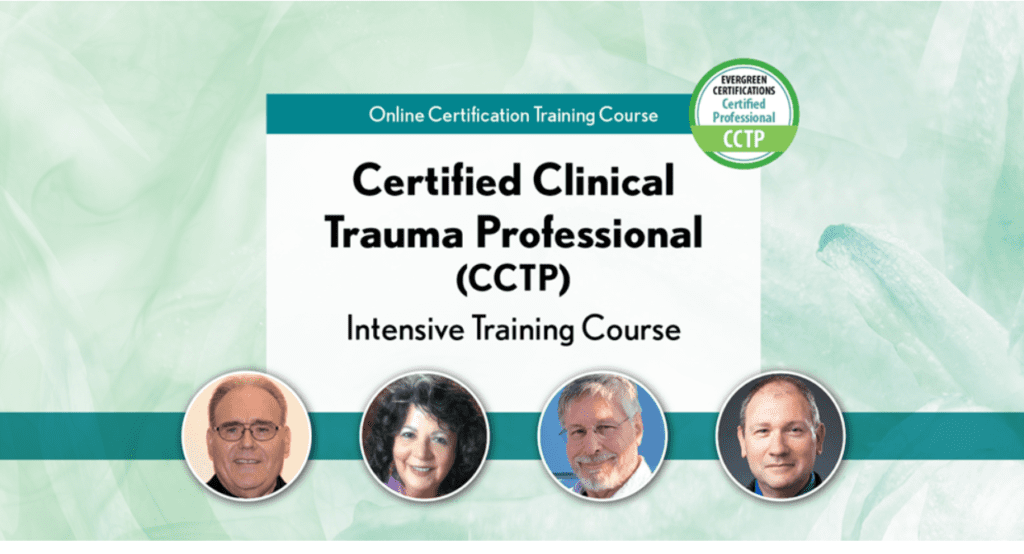
Looking to explore the world of trauma-informed therapy? Check out your options for professional Trauma Certification Training.
Trauma therapy is a type of psychotherapy that has been around for centuries. The core of trauma therapy is about helping individuals process and heal from traumatic experiences that can have a lasting impact on their mental and emotional health. The world of trauma therapy is vast and complex and is a rapidly evolving field with emerging techniques and new ways of meeting, feeling, and healing trauma.
When exploring the world of trauma therapy training, it’s important to find one that reflects the modern keystone of trauma healing, evolving beyond the more infamous forms of trauma therapy; Cognitive Behavioral Therapy (CBT), Eye Movement Desensitization and Reprocessing (EMDR), Exposure Therapy and Dialectical Behavior Therapy (DBT). The current day, the most impactful forms of trauma therapy are Body-based approaches and modalities, including Somatic therapy.
Somatic therapy has been around for centuries, with its roots in Eastern spiritual practices such as yoga and meditation, and has since become one of the most recognized and powerful avenues of trauma healing. Body-based therapies are quickly becoming the most advanced, transformational way to facilitate deep, lasting trauma healing
Trauma therapy has become a world-wide recognized field as people discover the profound benefits, impacts & life changes it provides. Trained trauma practitioners are now working in many avenues of wellness professions including psychologists, psychiatrists, social workers, physicians, nurses, emergency medical technicians, teachers, Holistic Health Coaches, Life Coaches, and Yoga Teachers.
Navigating trauma training certification options is complex and can be overwhelming. This is a great article that will help you to digest all your options and confidently enroll in the best training program for you.
Below is a list of the top schools to choose from so you can get started on your more advanced, powerful trauma therapy path.
What’s important when choosing trauma therapy training?
There are several factors you’ll want to consider before choosing a trauma training program. The field of trauma is vast and largely unregulated, meaning there are many different career tracks you can take. Programs range significantly from weekend immersions to 3-year mastery, university-level courses while all having different requirements to join the training.
It can be confusing initially navigating all your options for certification and training. This article is a great resource to help you navigate all your options.
Types of Therapies in Training:
Different programs offer different approaches to trauma therapy, so make sure you understand what type of training you’ll be receiving and what modalities are involved. Some programs focus on cognitive-behavioral therapy, while others may offer a more body-based approach. Some programs are short, 12-15 hour overviews designed to meet continuing education credits, others are more comprehensive in a single modality and can go up to 500 hours of training. Make sure that the program is up to date with the latest research and techniques in the field.
Budget:
An important factor you’ll need to consider is the investment. You’ll have to consider and decide if you’re ready to invest in a 3-year, $9,000 mastery program or if you desire a shorter, introductory course to begin your journey with. Generally, short continuing education courses are under $1,000, while deep dives into specific modalities can cost upwards of $10,000. It’s a good approach to take shorter, overview training in the beginning as you discover what track you’d like to go down.
The Environment (online vs. in-person):
Most trauma training now is run online, although there are some options for in-person training as well.
Many environments for trauma training are more clinical and educational, while others are more spiritual and run as a group experience. Make sure you’ll be learning from experienced and qualified instructors in the trauma field who aren’t only knowledgeable but truly embody the teachings. Select a program that inspires you and you feel intuitively guided to.
Taking all of these factors into account will help ensure that you select the right trauma therapy training program for your needs.
1. The Aura Institute – Integrative Trauma Practitioner™ Training

This is our top choice and by far the most carefully thought-out program for coaches and therapists looking to enhance their skills in trauma.
If you’re looking to become certified in trauma, one of the challenges you’ll run into is finding training that is either very short (10-20 hours) that gives you an educational introduction to trauma, or specific modalities such as Somatics or EFT that require you to train for hundreds of hours, only to be certified in one modality.
The Aura Institute is a great option for trauma training because you get a great general overview of trauma, and training in 3-6 different practical training modalities. The training is 50 hours for level 1, and 125 hours for level 2, giving you a chance to get your feet wet before diving in. The teachers, including famous therapists Hala Khouri and Stephanie Scarminach, are top-notch.
The curriculum is geared towards coaches, therapists, and holistic practitioners giving you practical trauma modalities you can immediately apply in a one-on-one client setting.
Take the first step by signing up for the Aura Institute training to become a certified Integrative Trauma Coach and Practitioner. Inside the introductory, Level-1, ten-week training, you’ll be guided with live lectures, break-out rooms, practices, and real-time demonstrations as you learn the most integrative, body-based approaches including; Trauma-Informed Breathwork, Somatic Therapy, and Body Trauma Liberation™ method. You’ll be guided through first-hand experience to create your own relationship with these modalities to truly embody the power of these teachings and be a living example for your clients. The atmosphere inside the Aura Institute is designed to be supportive, empowering, and feel exciting to bring new gifts, tools, and techniques into your life and into your clinic.
Certification: Integrative Trauma Practitioner (Levels 1 & 2)
Continuing Education: In the approval process
Length: 10 weeks (level 1)
Price: $2,450
Website: https://aurainstitute.org/
2. Trauma Healing Training

The Trauma Healing Training, led by Somatic Experiencing International, is designed to provide a comprehensive understanding of Somatic Experiencing (SE), a body-oriented approach to healing trauma, as well as the skills and tools necessary to effectively use it in practice. The program is divided into online and in-person learning that consists of training modules, workshops, and seminars spaced out over 2½ to 3 years. The Trauma Healing Training covers topics such as the neurophysiology of trauma, the Somatic Experiencing approach to working with trauma, and the application of SE in various clinical settings.
The program includes a variety of techniques, such as mindfulness, body-based practices, and self-regulation skills, to help individuals learn to manage their stress and emotions. You’ll receive an in-depth, holistic understanding of this deep healing, and develop the skills and knowledge to effectively address the physical, emotional, and psychological effects of trauma. The facilitators of this program work closely with you as you develop the skills and confidence with the SE technique in a hands-on setting. You’ll complete this training ready and eager to bring this beautiful modality into your practice and career.
Upon completion of the program, participants are eligible to become certified Somatic Experiencing Practitioners.
Certification: Trauma Healing: A Comprehensive Approach to Resolving Trauma
Continuing Education: 24 Continuing Education (CE) credits
Length: 3 years
Price: Total – $9130
Website: https://traumahealing.org/training/
3. Sensorimotor Psychotherapy for Trauma Training
This comprehensive trauma Level-1 training is available online, in a hybrid style, or in person to make it accessible to mental health professionals. The Sensorimotor Psychotherapy for Trauma training program is designed to help mental health professionals learn how to effectively use Sensorimotor Psychotherapy (SP) to treat trauma. SP is an evidence-based, body-oriented approach to psychotherapy that focuses on the connection between physical sensations and emotions. Through this 9-week program, you will gain an understanding of the theory and practice of SP, as well as learn how to apply the techniques with your clients.
This program includes lectures, experiential exercises, and supervised practice sessions to ensure your mastery and developed expertise. This training will help you develop the skills necessary to effectively assess and treat trauma using Sensorimotor Psychotherapy, as well as gain the knowledge and tools to integrate it into a safe and supportive environment for your clients.
Certification: Sensorimotor Psychotherapist Level 1 (SP-L1)
Continuing Education: 15 Continuing Education (CE) credits
Length: 46 hours
Price: Inquire on Website
Website: https://sensorimotorpsychotherapy.org/curriculum/trauma/
4. Integrative Psychotherapy Trauma Training
This community-based interactive Integrative Psychotherapy trauma training course, founded by Esther Goldstein, is a 6-month journey for mental health professionals to develop trauma-informed skills to bring into their clinic. You’ll become well-versed in the pieces that can make trauma work challenging: attachment work, shame, grief, triggers, and trauma responses. Inside the 6-month course, you will be supported with new modules released every week and nurtured inside the bi-weekly, 90-minute, consult group calls led by Esther.
The group calls bring a special type of magic as you’ll have the opportunity to practice your new skills so you can naturally integrate them into client sessions with ease and get all your questions answered live.
This deeply supportive, interactive group course will prepare you well to apply your trauma-informed skills with your clients.
Certification: certificate of completion in Integrative Trauma Treatment Training
Continuing Education: In the approval process
Length: 6 months
Price: $4,300
Website: https://integrativepsych.co/trauma-therapists1/6-month-trauma-therapist-program
5. Trauma-Informed Clinical Practice

The Trauma-Informed Clinical Practice (TICP) self-study program at New York University (NYU) is designed to provide mental health professionals with a foundation of the most current evidence-based treatment for specific disorders and help clinicians better understand the impact of trauma on their clients. You will learn the tools and resources to better serve those clients. The program is based on the principles of trauma-informed care, which emphasizes the importance of understanding the impact of trauma on an individual’s life, and the need to provide holistic, comprehensive, and compassionate care. The program includes a variety of courses, including courses on trauma-informed assessment, trauma-informed interventions, and trauma-informed supervision.
The TICP program is a self-study program that’s divided into four modules, each of which focuses on a different aspect of trauma-informed clinical practice. TICP gives you the resources and skills to develop your own trauma-informed practice and better serve your clients as you create a conducive environment for healing.
Best part?! The TICP program is designed to be flexible and accessible, making it an ideal choice if you’re busy clinicians who need to fit a program into your existing schedule.
Certification: Certified Trauma-Informed Clinical Practitioner
Continuing Education: None
Length: 36 hours
Price: $1,100
6. Essentials of Trauma Treatment: Certified Clinical Trauma Professional (CCTP) Training Course
This certified clinical trauma professional training course, offered by PESI, provides a comprehensive overview of the most effective evidence-based strategies for treating complex trauma in individuals, families, and communities. The certified clinical trauma professional training course is designed to provide clinicians with an overview of the cognitive-behavioral therapy (CBT) approach to treating posttraumatic stress disorder (PTSD).
It covers a variety of topics, including the neurobiology of trauma, the impact of trauma on the brain, the role of attachment in trauma, and the use of cognitive-behavioral and somatic interventions. It also includes interactive activities, case studies, and practical exercises to help participants gain a deeper understanding of trauma and its effects. This course is designed to provide healthcare professionals with the knowledge and skills to effectively assess, diagnose, and treat individuals who have experienced trauma.
You will study with and learn from experienced professionals who specialize in the field of trauma. This shorter course is a great starter into the world of developing your clinical skills to support clients navigating trauma.
Great news! All the course content is based on the latest research and evidence-based practices.
Certification: Certified Clinical Trauma Professional (CCTP-Level 1)
Continuing Education: 15 Continuing Education (CE) credits
Length: 6 hours
Price: $599
Website: https://catalog.pesi.com
7. Trauma Resiliency Model (TRM)® Training & Certification Program

The Trauma Resiliency Model (TRM)® Training program is offered by the Trauma Resource Institute (TRI), a non-profit organization dedicated to providing trauma-informed care and education to individuals, organizations, and communities. TRM® training program has three levels. The program is designed to provide you with an in-depth understanding of the TRM® while learning in person in a hands-on setting and online.
You will learn about the principles of the TRM® and how to use it to create a trauma-informed environment. The program includes lectures, case studies, and interactive activities. If you’re looking for a way to help people who have experienced trauma, the TRM® Training program is a great way to get started.
Certification: TRM Certificate of Completion
Continuing Education: up to 15 CE credits
Length: 8 days
Price: $1,500-$2,500
Website: https://www.traumaresourceinstitute.com/trm-trainings
8. Trauma Institute International – Certification Program

The Certified Clinical Trauma Specialist – Individual (CCTS-I) is a comprehensive, self-paced online program that’s designed to provide professionals with the knowledge and skills necessary to effectively assess, diagnose, and treat individuals who have experienced trauma. THE CCTS-1 covers topics such as trauma-informed care, trauma-focused cognitive behavioral therapy, and trauma-sensitive interventions.
The CCTS-I program provides specialized training in the use of trauma-informed interventions, such as relaxation techniques, self-regulation, self-care strategies, exposure, and narrative for trauma treatment. This specialized course will support you to gain crucial tools to make a positive impact in the lives of clients who have experienced traumatic events.
Certification: Certified Clinical Trauma Specialist (CCTS)
Continuing Education: 10 hours
Length: 20 hours
Price: $100
9. Integrative Somatic Trauma Therapy Certification
The Integrative Somatic Trauma Therapy Certificate program by the Embody Lab is a unique and comprehensive 3-month program based on the latest research and evidence-based approaches to trauma therapy and provides you with the tools to help your clients heal from trauma. You will develop the skills and knowledge necessary to effectively work with clients who have experienced trauma.
This highly interactive and experiential program includes a range of topics, including trauma-informed care, somatic approaches to healing, and the integration of mindfulness and body-based practices. It also covers the neuroscience of trauma, the effects of trauma on the body and mind, and the importance of self-care for practitioners with a focus on developing skills and competencies in a safe and supportive environment.You will have the opportunity to practice and apply the skills you’ve learned so you can integrate them into your own practice.
Good news! The program is designed to be accessible to practitioners from all backgrounds, including those with no prior experience in trauma therapy.
Certification: certificate of completion
Continuing Education: CEs possible
Length: 60-hours
Price: $1,447
Website: https://www.theembodylab.com/schedule/somatic-trauma-therapy-certificate
1o. Trauma Therapy Certificate Program

This Trauma Therapy Certificate Program is an experiential group program that is designed for mental health professionals and focuses on the theoretical foundations of trauma, trauma-informed assessment, and evidence-based interventions. You will learn foundation frameworks and skills through lectures, demonstrations, and class practice. The Trauma Therapy Certificate Program also covers topics such as crisis intervention, self-care, and ethical considerations.
Upon completion of the program, you will be able to confidently identify and assess traumatic experiences, provide trauma-informed interventions, and develop effective treatment plans for clients.
Certification: Certificate in Trauma Therapy (CTT)
Continuing Education: 30
Length: 9 months
Price: $2050
Website: https://www.childtrauma.com/training/certificate-program/















